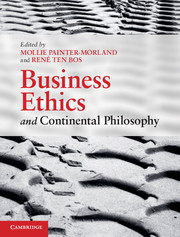Book contents
- Frontmatter
- Contents
- Figures
- Boxes
- Contributors
- Foreword
- Acknowledgements
- Introduction: critical crossings
- 1 Agency in corporations
- 2 Stakeholder theory
- 3 Organizational culture
- 4 Enron narrative
- 5 Moral decision-making
- 6 Organizational justice
- 7 Reward, incentive, and compensation
- 8 Leadership
- 9 Whistle-blowing
- 10 Marketing, bad faith, and responsibility
- 11 Corporate social responsibility
- 12 Corporate responsibility standards
- 13 Sustainability
- 14 Globalization
- Glossary
- Name index
- Subject index
- References
7 - Reward, incentive, and compensation
Published online by Cambridge University Press: 05 June 2012
- Frontmatter
- Contents
- Figures
- Boxes
- Contributors
- Foreword
- Acknowledgements
- Introduction: critical crossings
- 1 Agency in corporations
- 2 Stakeholder theory
- 3 Organizational culture
- 4 Enron narrative
- 5 Moral decision-making
- 6 Organizational justice
- 7 Reward, incentive, and compensation
- 8 Leadership
- 9 Whistle-blowing
- 10 Marketing, bad faith, and responsibility
- 11 Corporate social responsibility
- 12 Corporate responsibility standards
- 13 Sustainability
- 14 Globalization
- Glossary
- Name index
- Subject index
- References
Summary
Goals of this chapter
After studying this chapter you will be able to:
identify the ethical issues that arise in and through reward, incentives, and compensation practices in organizations;
understand the limitations of justice-based arguments in dealing with these issues;
explore the importance of revaluation in rethinking reward, incentive, and compensation in organizations;
recognize the corporate ethos created through reward structures;
question the reward and compensation practices employed in corporations.
Debating rewards, incentives, and compensation after the financial crisis
With the onset of the financial crisis that hit the world in 2008–9, the question of what constitutes a fair reward for contributions to the success or failure of corporations once again became a matter of fierce debate. In fact, the large bonuses received by executives of some failed companies became the source of moral outrage among politicians and citizens alike. One of the reasons for this outrage is the fact that the compensation paid to some executives seemed to ignore the mistakes they made in running their companies. Nor did it account for the irresponsible, and perhaps even immoral, risks that some took, or of the pernicious effect that it ultimately had on the lives of millions of people around the world. The decisions and behaviour of these highly compensated executives substantially contributed to the ‘housing bubble’, which ultimately precipitated a domino effect of failures in multiple financial institutions. Many people lost their life savings as a result, yet corporate executives seemed to be largely shielded from the effects of their bad decisions through carefully constructed bonus structures and severance packages, or ‘golden parachutes’. It is little wonder, then, that many people began to question whether such payouts were fair or ethical. The compensation that executives receive is, however, only one instance of the way in which reward systems in organizations can have significant ethical ramifications. Besides the issue of executive compensation, the problem of fair reward and compensation in organizations is manifested in controversies about equal pay for equal work, employee stock ownership options, and bonuses and other incentive schemes, as well as in debates around fair performance management and retrenchment processes for all employees.
- Type
- Chapter
- Information
- Business Ethics and Continental Philosophy , pp. 162 - 180Publisher: Cambridge University PressPrint publication year: 2011



